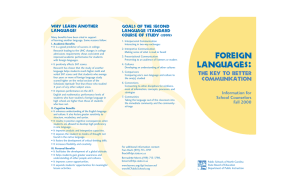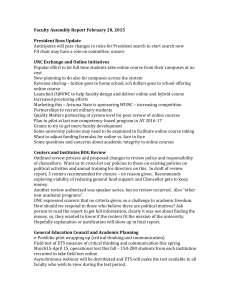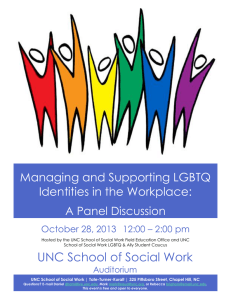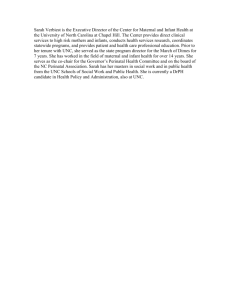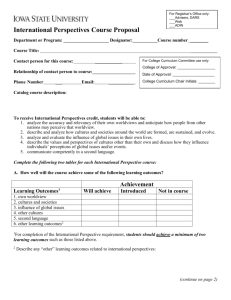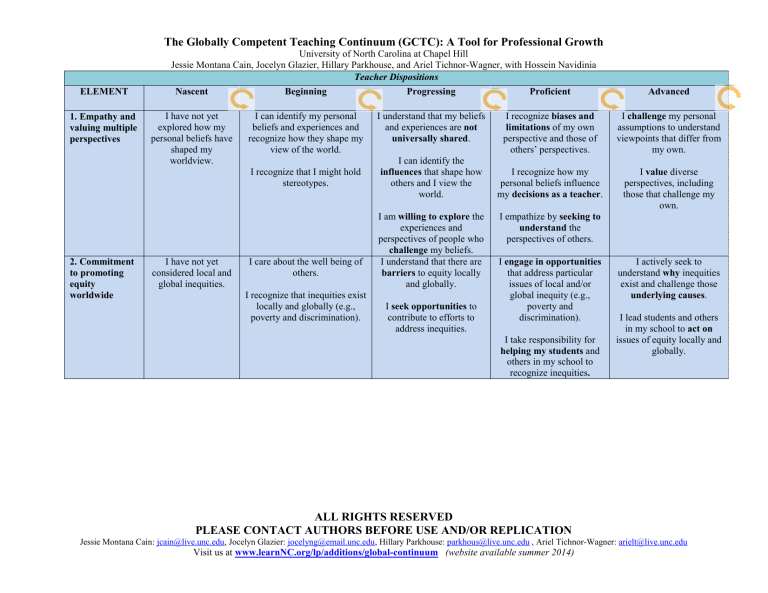
The Globally Competent Teaching Continuum (GCTC): A Tool for Professional Growth
ELEMENT
1. Empathy and
valuing multiple
perspectives
University of North Carolina at Chapel Hill
Jessie Montana Cain, Jocelyn Glazier, Hillary Parkhouse, and Ariel Tichnor-Wagner, with Hossein Navidinia
Teacher Dispositions
Nascent
Beginning
Progressing
Proficient
I have not yet
explored how my
personal beliefs have
shaped my
worldview.
I can identify my personal
beliefs and experiences and
recognize how they shape my
view of the world.
I recognize that I might hold
stereotypes.
2. Commitment
to promoting
equity
worldwide
I have not yet
considered local and
global inequities.
I care about the well being of
others.
I recognize that inequities exist
locally and globally (e.g.,
poverty and discrimination).
I understand that my beliefs
and experiences are not
universally shared.
I can identify the
influences that shape how
others and I view the
world.
I am willing to explore the
experiences and
perspectives of people who
challenge my beliefs.
I understand that there are
barriers to equity locally
and globally.
I seek opportunities to
contribute to efforts to
address inequities.
Advanced
I recognize biases and
limitations of my own
perspective and those of
others’ perspectives.
I challenge my personal
assumptions to understand
viewpoints that differ from
my own.
I recognize how my
personal beliefs influence
my decisions as a teacher.
I value diverse
perspectives, including
those that challenge my
own.
I empathize by seeking to
understand the
perspectives of others.
I engage in opportunities
that address particular
issues of local and/or
global inequity (e.g.,
poverty and
discrimination).
I take responsibility for
helping my students and
others in my school to
recognize inequities.
I actively seek to
understand why inequities
exist and challenge those
underlying causes.
I lead students and others
in my school to act on
issues of equity locally and
globally.
ALL RIGHTS RESERVED
PLEASE CONTACT AUTHORS BEFORE USE AND/OR REPLICATION
Jessie Montana Cain: jcain@live.unc.edu, Jocelyn Glazier: jocelyng@email.unc.edu, Hillary Parkhouse: parkhous@live.unc.edu , Ariel Tichnor-Wagner: arielt@live.unc.edu
Visit us at www.learnNC.org/lp/additions/global-continuum (website available summer 2014)
The Globally Competent Teaching Continuum (GCTC): A Tool for Professional Growth
University of North Carolina at Chapel Hill
Jessie Montana Cain, Jocelyn Glazier, Hillary Parkhouse, and Ariel Tichnor-Wagner, with Hossein Navidinia
Teacher Knowledge
ELEMENT
Nascent
Beginning
Progressing
Proficient
Advanced
3. Understanding
of global
conditions and
current events
I do not yet have
knowledge of world
conditions and current
events.
I have a basic understanding
of world geography.
I can articulate
geographical, historical
political, economic, social
and/or cultural influences
on current events.
I seek out multiple sources
to understand contrasting
perspectives on an issue.
I regularly seek resources
from varied perspectives
and opportunities to stay
informed on local and
global issues.
I have a basic understanding
of current local and/or global
events.
I stay informed on current
local and global issues.
I can access multiple
resources that portray
current events.
4. Understanding
of the ways that
the world is
interconnected
I have not yet
considered the ways
the world is
interconnected.
I recognize that our world is
interconnected and
interdependent (e.g.,
economically, socially,
culturally, and
environmentally).
I recognize that the ways in
which the world is
interconnected are constantly
changing.
5. Experiential
understanding of
multiple cultures
I have not yet reflected
on my own cultural
values and norms.
I have not yet
considered
experiencing other
cultures.
I am aware of my own
cultural practices, values, and
norms in relation to other
cultures.
I am interested in
experiencing other cultures.
I understand ways that a
global issue impacts my
local context (including
myself, my students, and
my local community).
I can explain ways that
global issues impact my
local context and
individuals in other
nations.
I understand ways that a
global issue impacts
cultures or nations aside
from my own.
I can explain global
influences on local issues
and local influences on
global issues.
I understand differences in
practices, values, and norms
across cultures.
I demonstrate knowledge
of various cultures through
cultural immersion
experiences (e.g., study
abroad and local
immersion).
I understand that multiple
perspectives exist within
and across cultures.
I seek opportunities to
experience other cultures.
I reflect upon the
immersion experience in
relation to my own cultural
constructs, perspectives,
and educational practices.
I think critically about the
potential impact of current
events on future conditions,
both locally and globally.
I can critically analyze
ways that global
interconnectedness
contributes to inequities
within and between
nations.
I can explain how actions I
take at the local, national,
or international level
address inequities related to
our interconnected world.
I critically relate multiple
cultural immersion
experiences to each other
and to my own
perspectives and practices.
I modify my educational
practices and/or advocate
for changing educational
policies and practices based
upon immersion
experiences and
understanding of multiple
perspectives.
ALL RIGHTS RESERVED
PLEASE CONTACT AUTHORS BEFORE USE AND/OR REPLICATION
Jessie Montana Cain: jcain@live.unc.edu, Jocelyn Glazier: jocelyng@email.unc.edu, Hillary Parkhouse: parkhous@live.unc.edu , Ariel Tichnor-Wagner: arielt@live.unc.edu
Visit us at www.learnNC.org/lp/additions/global-continuum (website available summer 2014)
The Globally Competent Teaching Continuum (GCTC): A Tool for Professional Growth
6. Understanding
of intercultural
communication
University of North Carolina at Chapel Hill
Jessie Montana Cain, Jocelyn Glazier, Hillary Parkhouse, and Ariel Tichnor-Wagner, with Hossein Navidinia
I am not yet familiar
I am aware that different
I can identify strategies
I can use strategies to
with cultural
cultures may have different
that enhance intercultural
effectively navigate
differences in
ways of communicating (e.g.,
communication.
intercultural interactions.
communication.
differences in language,
gestures, and norms for
I can explain the
I understand that learning
communicating).
relationship between
languages has social,
language, communication,
emotional, and cognitive
and identity.
aspects.
I critically reflect on how
particular languages and
modes of communication
are valued more than
others and the effect that
this has on identity.
I can help others navigate
the social, emotional, and
cognitive aspects of
intercultural
communication.
ALL RIGHTS RESERVED
PLEASE CONTACT AUTHORS BEFORE USE AND/OR REPLICATION
Jessie Montana Cain: jcain@live.unc.edu, Jocelyn Glazier: jocelyng@email.unc.edu, Hillary Parkhouse: parkhous@live.unc.edu , Ariel Tichnor-Wagner: arielt@live.unc.edu
Visit us at www.learnNC.org/lp/additions/global-continuum (website available summer 2014)
The Globally Competent Teaching Continuum (GCTC): A Tool for Professional Growth
University of North Carolina at Chapel Hill
Jessie Montana Cain, Jocelyn Glazier, Hillary Parkhouse, and Ariel Tichnor-Wagner, with Hossein Navidinia
Teacher Skills
ELEMENT
7. Communicate
in multiple
languages
Nascent
I speak one language and
have not yet pursued
learning another.
Beginning
I am pursuing or have
pursued learning a
language other than my
own.
Progressing
I can have basic
conversation in two
languages (including my
own).
Proficient
I am proficient in at least
two languages (including
my own).
I can effectively
communicate with
students and families in at
least two languages.
8. Create a
classroom
environment
that values
diversity and
global
engagement
9. Integrate
learning
experiences for
students that
promote
content-aligned
explorations of
the world
I do not yet consider
global issues or diverse
perspectives and cultures
in my classroom.
I do not yet include global
learning experiences
aligned with content
standards.
I discuss global
engagement and valuing
of diverse perspectives
and cultures in my
classroom.
I can identify global
learning experiences that
align with content
standards.
I engage students in
learning about other
cultures by emphasizing
the relevance of global
issues to students’ lives.
I teach my students to
respect and learn from
diverse perspectives and
cultures.
I teach my students to
respect diverse
perspectives and cultures.
I provide opportunities
for students to
collaboratively discuss
global issues.
My classroom contains
resources that represent
multiple global
perspectives.
I consistently encourage
students to use resources
in my classroom for
global learning.
I integrate into my
instruction global learning
experiences aligned with
my students' interests
and content standards.
I regularly integrate realworld and challenging
global learning
experiences aligned with
my students' interests and
content standards.
Advanced
I am fluent in at least two
languages and seek
opportunities to use
them in schools and
communities.
I help my students
develop a concern for
global issues, an interest
in learning more about
diverse cultures, and a
desire to take action.
.
I reflect on my students’
global learning
experiences and revise my
teaching accordingly.
I support the school
community in integrating
global learning
experiences.
ALL RIGHTS RESERVED
PLEASE CONTACT AUTHORS BEFORE USE AND/OR REPLICATION
Jessie Montana Cain: jcain@live.unc.edu, Jocelyn Glazier: jocelyng@email.unc.edu, Hillary Parkhouse: parkhous@live.unc.edu , Ariel Tichnor-Wagner: arielt@live.unc.edu
Visit us at www.learnNC.org/lp/additions/global-continuum (website available summer 2014)
The Globally Competent Teaching Continuum (GCTC): A Tool for Professional Growth
10. Facilitate
intercultural
and
international
conversations
that promote
active listening,
critical thinking,
and perspective
recognition
University of North Carolina at Chapel Hill
Jessie Montana Cain, Jocelyn Glazier, Hillary Parkhouse, and Ariel Tichnor-Wagner, with Hossein Navidinia
I do not yet provide
I provide opportunities
I provide opportunities for
I provide ongoing
opportunities for students
during the school year for
students to converse with
opportunities for students
to converse with
students to converse with
individuals from other
to converse with
individuals from other
individuals from other
cultures or nations, in
individuals from other
cultures or nations.
cultures or nations.
cultures or nations, in
which students
which students
demonstrate active
demonstrate active
listening, critical
listening, critical thinking,
thinking, and/or
perspective recognition.
and perspective
recognition.
My students initiate
communication with
individuals from across
cultures and nations, in
which they demonstrate
active listening, critical
thinking, and perspective
recognition.
11. Develop
local, national,
or international
partnerships
that provide
real world
contexts for
global learning
opportunities
I do not yet create
opportunities for my
students to communicate
with local, national, or
international organizations
or individuals.
I present students with an
opportunity to participate
in a global learning
experience with local,
national, or international
organizations or
individuals.
I present students with
opportunities for shortterm collaboration with
local, national, or
international organizations
to learn about the world.
I develop local, national,
and/or international longterm partnerships that
allow my students to learn
about the world with
diverse communities.
I guide my students to
develop local, national,
and international
partnerships, direct their
own communication with
these partners, and
develop their own global
learning opportunities.
12. Develop and
use appropriate
methods of
inquiry to assess
students' global
competence
development
I am not yet familiar with
how to assess students’
global competence
development.
I am familiar with
resources to assess
students' global
competence development.
I develop and use
appropriate assessments
of students' global
competence development.
I develop and use
frequent, authentic, and
differentiated
assessments of students'
global competence
development.
I guide students to
evaluate their own global
competence development.
I can provide students
feedback and analyze
students' global
competence development.
I can provide students
with constructive
feedback and analyze
students' performance to
inform subsequent
instruction.
ALL RIGHTS RESERVED
PLEASE CONTACT AUTHORS BEFORE USE AND/OR REPLICATION
Jessie Montana Cain: jcain@live.unc.edu, Jocelyn Glazier: jocelyng@email.unc.edu, Hillary Parkhouse: parkhous@live.unc.edu , Ariel Tichnor-Wagner: arielt@live.unc.edu
Visit us at www.learnNC.org/lp/additions/global-continuum (website available summer 2014)

